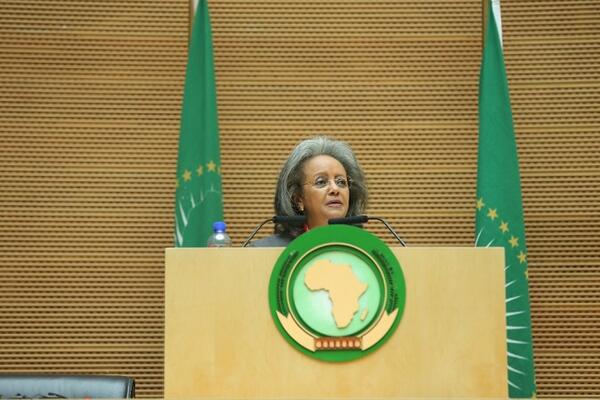
World Export Development Forum 2019 opening speech by H.E. President Sahle-work Zewde (en)
Addis Ababa, Ethiopia
Excellencies,
Distinguished Guests,
Ladies and gentlemen,
It is with great pleasure I welcome you to Addis Abeba, to attend the World Export Development Forum 2019 which is co hosted by the African Union, the Government of the Federal Democratic Republic of Ethiopia and International Trade Centre, a crucial forum that is perfectly timed to align with the Africa Industrialization Week and clearly affirming the interdependence between industrialization and export development.
It is beyond doubt that our continent has immense economic potentials and is poised to firmly mark its participation in the global trade arena. We are transitioning into an era where Africa is becoming a key player in global trade, investment, and industrialization in contrast to its past marginal role. Currently, Africa has become a top destination for international investments and has been gaining a ground as a major trading partner.
More importantly, the effort to facilitate free trade among African countries and enhance the continent’s competitiveness has taken a shape and made a significant step with the signing and the subsequent ratification of the African Continental Free Trade Agreement by the majority of African States, in which my country Ethiopia has played its pivotal role to bring the agreement into effect.
I would like seize this opportunity to congratulate all States for bringing to life such a sizable free trade agreement which covers 1.27 billion consumers with an estimated market value of 3.4 trillion US dollars. Effective implementation of the Continental Free Trade Agreement immensely contributes to Africa’s industrialization, private sector growth, job creation, and balanced trade.
Therefore, further, to endorsing the agreement, it is high time to expedite its implementation in order to unleash complementary economic ecosystem among African nations to utilize full potential of the continent in becoming leading exporter in international trade. With this I would like to express Ethiopia’s strong commitment to materialize the implementation of the agreement and I would also like to call upon all African states to effectively do so.
When drafting new domestic policies and revising the old ones, States need to factor in and ensure their alignment with the Continental Free Trade Agreement. In this regard, Ethiopia has recently introduced a Homegrown Economic Policy in line with its development vision, Agenda 2063 and sustainable development Goals. The Homegrown Economic Policy is aimed to set Ethiopia on a path to prosperity through job creations, inclusive growth, and poverty reduction. Specifically, the policy plans to leverage the growth achieved in the past decade and balance it with increased productivity by triggering innovation; enhancing industrialization; diversifying and increasing exports; and ensuring a robust macro economy through comprehensive and synchronized set of macroeconomic, structural, and sectoral measures coupled with strong regional trade integration.
Excellencies,
The role of industrialization in gearing up regional trade and integration is apparent. Ethiopia has a set vision to become a leading manufacturing hub of Africa by 2025. To realize this vision, the country has been implementing complementary strategies which include identification of priority investment areas; creation of investment enabling conditions; development of infrastructures and industrial parks:
Primarily Ethiopia’s industrialization policy has identified strategic investment areas that boost productive investments, increase export competitiveness, create jobs, and enhance innovation. Major sectors identified include pharmaceuticals; textile &apparel; energy; horticulture; tourism; and ICT.
In order to create enabling environments for private sector participation under the prioritized sectors, Ethiopia has embarked on regulatory and institutional reforms. For example, the recently revised investment law has opened-up restricted sectors to private investments as well as identified sectoral investment opportunities that put special emphasis on agro-processing and value additions, among others. In addition, sector specific strategies, implementation roadmaps, and tailored fiscal and non-fiscal incentive regimes have been introduced.
Furthermore, the ongoing infrastructural investments aimed at improving ease of doing business on import and export trade logistics are showing early successes in cutting red tapes, enhancing investments, and contributing to effective and efficient regional and international trade.
The development of plug and play Industrial Parks has reduced the processes and costs associated with starting and operating manufacturing industries. The development and operation of these Industrial Parks rests on key principles of sector specialization, export orientation, vertical integration, sustainability, and skills transfers. Our parks have high occupancy rates of investors who are producing and exporting diverse products to international destinations.
Your excellencies,
Ladies and Gentlemen,
Our lesson so far indicates the importance of integrating regional and international commitments with national industrialization and export strategies. To expedite our industrialization process and grow our exports, it’s imperative we leverage the collective market size that we have as a continent. By creating a complementary economic system, we will be able to reap the full potential of our respective nations and become a major player in the international trade arena. Hence, I would like to call up on all African governments to put the joint development agenda at the core of their respective national policies.
In conclusion, observing the range of participants this event brings together, I believe that various perspectives and voices are represented, and the collective wisdom required to untangle the complex trade and industrialization problems is strongly present. I am also convinced that this forum will not only produce solutions but also draws out practical avenues for their timely and effective implementation. Therefore, I would like to take this opportunity to thank, the co-organizers of this successful event – the African Union and the International Trade Center.
Once again, I would like to welcome you to Ethiopia and wish you a great time during your stay in Addis Abeba.
Thank you.



